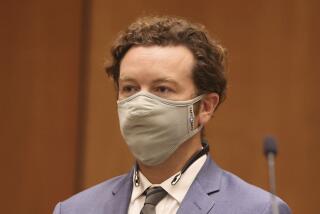Only Verdict Remains in Suit Against Judas Priest : Trial: The judge must decide whether the subliminal messages exist and, if so, whether they caused suicide attempts.
- Share via
The judge’s verdict is all that remains in the multimillion-dollar product-liability suit against the British rock group Judas Priest after final arguments were concluded Friday in a Reno courtroom.
Washoe District Judge Jerry Carr Whitehead said he expects to issue his ruling by Friday. The unprecedented product-liability lawsuit, which charges the heavy-metal quintet with causing the suicide attempts of two Sparks, Nev., youths in 1985, has drawn international attention.
Attorneys for the youths’ families have accused Judas Priest of recording the subliminal phrase “Do it” plus an assortment of backward messages promoting suicide on its 1978 album, “Stained Class.” The plaintiffs have spent the past four weeks trying to prove that the alleged subliminal implants spurred the youths to shoot themselves.
Judas Priest and CBS Records, the band’s record company, have denied using subliminal messages. Attorneys for the band have argued that the youths’ deaths were prompted by social and psychological problems attributed to unstable family environments.
It is now up to Judge Whitehead, who has presided over the trial without a jury, to decide whether the alleged subliminal messages exist and, if so, whether they did indeed cause the youths to shoot themselves.
In a landmark 54-page ruling written last August, Whitehead said that the court respected the First Amendment right of artists to express themselves, but refused to dismiss the case because he believed that subliminal messages do not share such privileges.
Subliminal communication, he said, is not protected because it does not advance any of the purposes of free speech and because it is a violation of privacy surreptitiously engaged in to manipulate the subconscious mind.
Attorneys for both sides have produced a plethora of expert witnesses, including psychologists, authors, lecturers, subliminal tape entrepreneurs and sound analysts. Parents of the youths and Judas Priest vocalist Rob Halford have also testified.
The case stems from the Dec. 23, 1985, shootings of Raymond Belknap, 18, and James Vance, 20, who, after an afternoon of beer drinking, pot smoking and listening to Judas Priest music, allegedly turned a sawed-off shotgun on themselves.
Belknap died on the spot. Vance survived his self-inflicted wound but was horribly disfigured. He died three years later in a local hospital after lapsing into an unexplained coma.
Four years ago, attorneys for the youths’ families filed the lawsuit against Judas Priest and CBS, seeking a minimum of $3.6 million in damages to compensate for the deaths, medical bills and support for a child Vance fathered after the suicide attempt.
More to Read
The biggest entertainment stories
Get our big stories about Hollywood, film, television, music, arts, culture and more right in your inbox as soon as they publish.
You may occasionally receive promotional content from the Los Angeles Times.








